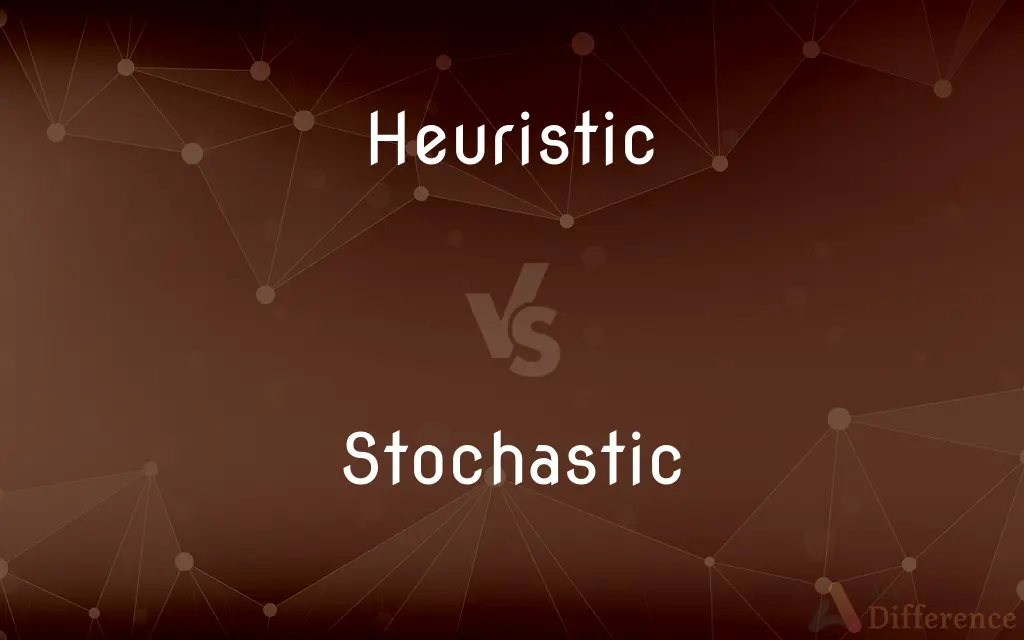Heuristic vs. Stochastic — What's the Difference?
By Urooj Arif & Fiza Rafique — Updated on March 29, 2024
Heuristic involves rule-of-thumb strategies for problem-solving, often simplifying decision-making. Stochastic pertains to processes influenced by randomness, focusing on probabilities and uncertainty.

Difference Between Heuristic and Stochastic
Table of Contents
ADVERTISEMENT
Key Differences
Heuristics are methods or strategies that simplify decision-making by using practical, experiential, and readily accessible knowledge, which may not be optimal but are efficient for quick judgment. Stochastic processes, on the other hand, are characterized by randomness and unpredictability, relying on probability theory to predict outcomes in systems influenced by inherently random variables.
While heuristics aim to reduce the complexity of decision-making processes, often leading to "good enough" solutions rather than optimal ones, stochastic models embrace complexity and uncertainty, attempting to understand and forecast outcomes in systems where chance plays a significant role. Heuristics are about efficiency and practicality in problem-solving, whereas stochastic methods are about managing and interpreting randomness.
In the context of algorithm design, a heuristic approach might be used to find a feasible solution within a reasonable time frame when dealing with NP-hard problems, where finding an optimal solution is computationally infeasible. Stochastic algorithms, such as Monte Carlo simulations, use randomness to explore possible outcomes, providing insights into the behavior of complex systems over a wide range of scenarios.
Heuristic methods are often employed in fields like psychology and behavioral economics, where they help explain how humans make decisions under constraints of time, information, and cognitive resources. Stochastic processes are widely used in finance, physics, and engineering to model phenomena that are inherently uncertain, such as stock market fluctuations or particle movements.
The key difference lies in the approach and application: heuristics simplify the decision-making process, often at the expense of precision, to achieve a satisfactory solution quickly. Stochastic processes, while acknowledging the inherent randomness in systems, seek to quantify uncertainty and make informed predictions through mathematical and statistical models.
ADVERTISEMENT
Comparison Chart
Definition
Simplified strategies for efficient problem-solving.
Processes influenced by randomness and probability.
Focus
Efficiency and practicality in decision-making.
Managing and interpreting uncertainty.
Key Characteristics
Rule-of-thumb, experiential knowledge.
Randomness, probability theory.
Application Fields
Psychology, behavioral economics, algorithm design.
Finance, physics, engineering, algorithm design.
Outcome
"Good enough" solutions, may not be optimal.
Predictive insights, embracing complexity.
Compare with Definitions
Heuristic
Rule-of-thumb method for quick decisions.
Using a heuristic, she quickly chose a route to avoid traffic.
Stochastic
Processes governed by random variables.
Stochastic modeling helps predict stock market trends.
Heuristic
Simplifies complex problems for practical solutions.
The designer applied a heuristic to streamline the user interface.
Stochastic
Uses probability to understand complex systems.
Engineers use stochastic simulations to anticipate material fatigue.
Heuristic
Relies on experiential knowledge and intuition.
His heuristic approach to cooking often yields delicious results.
Stochastic
Can offer predictive insights despite uncertainty.
Stochastic analysis revealed the likely outcomes of the project.
Heuristic
Can lead to cognitive biases and errors.
The availability heuristic made them overestimate the risk.
Stochastic
Employed in Monte Carlo simulations and other random algorithms.
The Monte Carlo method is a stochastic technique for risk assessment.
Heuristic
Useful in solving NP-hard problems by approximation.
The algorithm uses a heuristic to find a near-optimal solution quickly.
Stochastic
Inherent unpredictability and variation.
Stochastic weather models can forecast the probability of rain.
Heuristic
A heuristic (; from Ancient Greek εὑρίσκω (heurískō) 'I find, discover'), or heuristic technique, is any approach to problem solving or self-discovery that employs a practical method that is not guaranteed to be optimal, perfect, or rational, but is nevertheless sufficient for reaching an immediate, short-term goal or approximation. Where finding an optimal solution is impossible or impractical, heuristic methods can be used to speed up the process of finding a satisfactory solution.
Stochastic
Stochastic (from Greek στόχος (stókhos) 'aim, guess') refers to the property of being well described by a random probability distribution. Although stochasticity and randomness are distinct in that the former refers to a modeling approach and the latter refers to phenomena themselves, these two terms are often used synonymously.
Heuristic
Of or relating to a usually speculative formulation serving as a guide in the investigation or solution of a problem
"The historian discovers the past by the judicious use of such a heuristic device as the 'ideal type'" (Karl J. Weintraub).
Stochastic
Of, relating to, or characterized by conjecture; conjectural.
Heuristic
Of or constituting an educational method in which learning takes place through discoveries that result from investigations made by the student.
Stochastic
(Statistics) Involving or containing a random variable or process
Stochastic calculus.
A stochastic simulation.
Heuristic
(Computers) Relating to or using a problem-solving technique in which the most appropriate solution of several found by alternative methods is selected at successive stages of a program for use in the next step of the program.
Stochastic
Random, randomly determined.
Heuristic
A heuristic method or process.
Stochastic
Conjectural; able to conjecture.
Heuristic
Heuristics (used with a sing. verb) The study and application of heuristic methods and processes.
Stochastic
Random; chance; involving probability; opposite of deterministic.
Heuristic
(of an approach to problem solving, learning, or discovery) That employs a practical method not guaranteed to be optimal or perfect; not following or derived from any theory.
Stochastic
Of or pertaining to a process in which a series of calculations, selections, or observations are made, each one being randomly determined as a sample from a probability distribution.
Heuristic
That provides a useful, but not optimal, solution to a problem. Such algorithms are typically employed either because the only known algorithms that provide optimal solutions use too much time or resources, or else because there is no known algorithm that provides an optimal solution.
Stochastic
Being or having a random variable;
A stochastic variable
Stochastic processes
Heuristic
(of an argument) That reasons from the value of a method or principle that has been shown by experimental investigation to be a useful aid in learning, discovery and problem-solving.
Heuristic
A heuristic method.
Heuristic
The art of applying heuristic methods.
Heuristic
(computing) A heuristic algorithm or method.
Heuristic
Serving to promote discovery or learning; - used especially of thories or paradigms which stimulate new ideas for discovering facts in experimental sciences.
Heuristic
Serving to stimulate people to learn and discover on their own, especially by encouraging experimental and trial-and-error methods for solving problems.
Heuristic
Pertaining to or based on trial-and-error and experimental methods of learning and evaluation.
Heuristic
Based on the use of an efficient trial-and error method to search a space of possible solutions to a problem, or to find an acceptable approximate solution, when an exact algorithmic method is unavailable or too time-consuming.
Heuristic
A heuristic method; a specific heuristic procedure.
Heuristic
A theory or approach which serves to promote discovery or learning by encouraging experimentation.
Heuristic
A commonsense rule (or set of rules) intended to increase the probability of solving some problem
Heuristic
Of or relating to or using a general formulation that serves to guide investigation
Common Curiosities
Are all heuristic methods simple?
Heuristics vary in complexity, but their primary goal is to simplify decision-making, making them generally more straightforward than fully analytical methods.
Can stochastic processes be entirely predicted?
While exact outcomes of stochastic processes cannot be predicted, probabilities of different outcomes can be estimated.
What is a heuristic example in everyday life?
Choosing a familiar route home without considering possible traffic is an example of a heuristic.
How do stochastic models handle randomness?
They incorporate randomness directly into models, using statistical distributions to represent uncertain variables.
Why are heuristics used if they’re not always optimal?
Heuristics are used for their efficiency and practicality, especially when quick decisions are needed or full data analysis is impractical.
What is the main advantage of stochastic modeling?
Its main advantage is the ability to make informed predictions and assessments in the face of randomness and uncertainty.
What’s a common field where both heuristic and stochastic methods are used?
Algorithm design often employs both, with heuristics guiding quick solutions and stochastic models exploring a range of possible outcomes.
What is a limitation of using heuristics in complex problem-solving?
A limitation is that relying solely on heuristics can lead to oversimplified solutions that may not effectively address all aspects of complex problems.
Can a method be both heuristic and stochastic?
Yes, some methods incorporate both elements, using heuristics to simplify decision processes and stochastic elements to account for uncertainty.
Can stochastic methods be applied to decision-making like heuristics?
Yes, in decision-making under uncertainty, stochastic methods can help evaluate the probabilities of different choices leading to desired outcomes.
How do professionals verify the accuracy of stochastic models?
Accuracy is often verified through historical data comparison, simulations, and sensitivity analysis to understand how changes affect outcomes.
How do humans naturally use heuristics?
Humans use heuristics in decision-making to reduce cognitive load, applying past knowledge and experience to make quick judgments.
Is there a situation where heuristics perform better than stochastic models?
In situations requiring immediate decisions with limited information, heuristics can be more practical and faster to apply than complex stochastic models.
How do advancements in computing impact stochastic modeling?
Advancements in computing power and algorithms enhance the ability to perform complex stochastic simulations, increasing the accuracy and applicability of models.
How do heuristics relate to cognitive biases?
Heuristics can lead to cognitive biases when the simplified rules of thumb do not accurately reflect the current situation or when they overlook important information.
Share Your Discovery

Previous Comparison
Strut vs. Tie
Next Comparison
Ambigram vs. AnagramAuthor Spotlight
Written by
Urooj ArifUrooj is a skilled content writer at Ask Difference, known for her exceptional ability to simplify complex topics into engaging and informative content. With a passion for research and a flair for clear, concise writing, she consistently delivers articles that resonate with our diverse audience.
Co-written by
Fiza RafiqueFiza Rafique is a skilled content writer at AskDifference.com, where she meticulously refines and enhances written pieces. Drawing from her vast editorial expertise, Fiza ensures clarity, accuracy, and precision in every article. Passionate about language, she continually seeks to elevate the quality of content for readers worldwide.














































